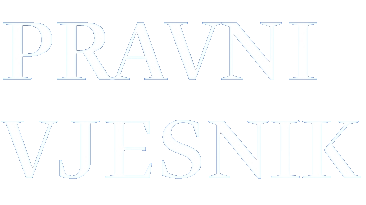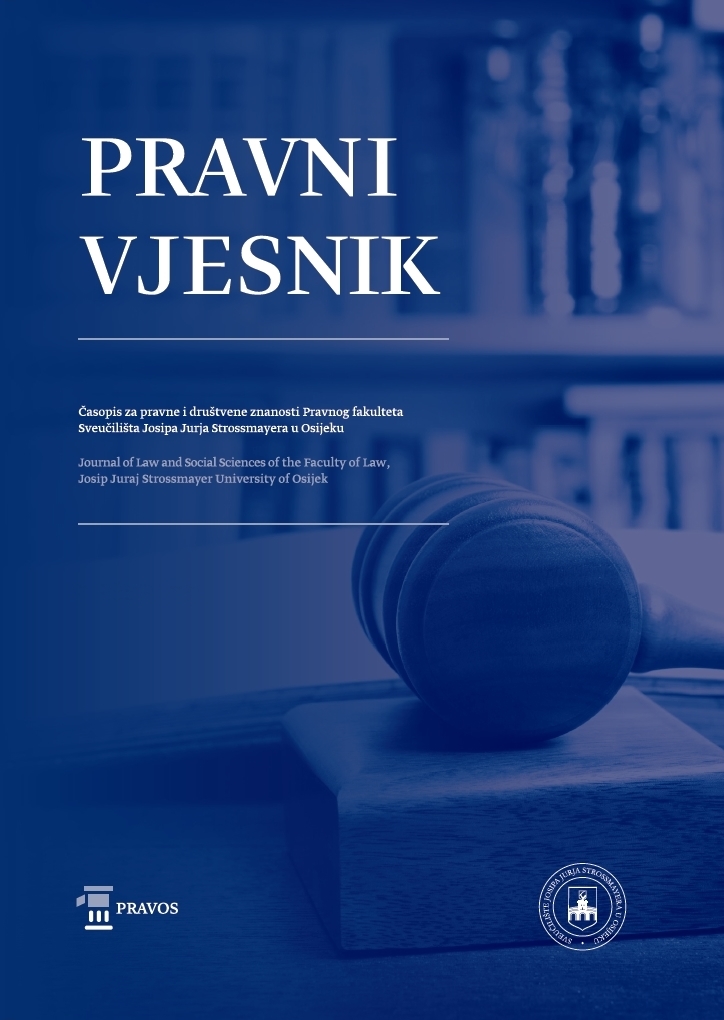UTJECAJ ODLUKA I NAČELA EUROPSKOG SUDA ZA LJUDSKA PRAVA NA UREĐENJE INSTITUTA POSEBNIH DOKAZNIH RADNJI U UJEDINJENOJ KRALJEVINI S POSEBNIM NAGLASKOM NA PRESRETANJE KOMUNIKACIJA
DOI:
https://doi.org/10.25234/pv/16994Ključne riječi:
posebne dokazne radnje, ESLJP, EKLJP, pravo na zaštitu privatnog i obiteljskog života, RIPA, IPASažetak
Regulatorni je mehanizam presretanja komunikacija u Ujedinjenoj Kraljevini doživio supstancijalne izmjene u posljednjih nekoliko desetljeća. Sve do presuđenja ESLJP-a u predmetu Malone (1984.), u kojem je konstatirana povreda prava na zaštitu privatnog i obiteljskog života iz čl. 8. EKLJP-a, Ujedinjena Kraljevina nije ni imala koncizan zakonodavni okvir koji bi regulirao materiju presretanja komunikacija. Kroz standarde postulirane praksom ESLJP-a mijenjani su i zakonodavni okviri koji reguliraju predmetnu materiju. Implementacija EKLJP-a u britanski pravni sustav nametnula je više standarde kad je riječ o zaštiti privatnog života kako to jamči čl. 8. EKLJP-a u ozračju kojih cammon law pristup da „policija može raditi što želi sve dok to nije zakonom zabranjeno“, više nije bio održiv.
Institut posebnih dokaznih radnji u Ujedinjenoj Kraljevini normiran je posebnim zakonima o istražnim ovlastima te pripadajućim kodeksima prakse, a ne Zakonom o kaznenom postupku, kako je to slučaj u zemljama kontinentalne pravne tradicije. U radu autorica analizira zakonodavne promjene koje su prethodile donošenju Zakona o uređenju istražnih ovlasti iz 2000. (RIPA), kao i novi Zakon o istražnim ovlastima iz 2016 (IPA). Potonji predstavlja najveću reformu britanske regulative mehanizma presretanja komunikacija jer je prvi put u Ujedinjenoj Kraljevini inkorporiran sudski element za autorizaciju naloga, doduše samo za pojedine oblike posebnih dokaznih radnji koje su predmetom njegove regulacije. Za preostale posebne dokazne radnje koje su (još uvijek ostale) pod okriljem regulacije RIPA-e još uvijek je imanentna odsutnost sudske kontrole, barem u fazi izdavanja i produljenja naloga za njihovo provođenje, ali je uveden poseban oblik ex post facto sudske kontrole. Slijedom navedenog nameće se pitanje jesu li recentnim zakonodavnim izmjenama ispunjeni standardi kako ih je formirao ESLJP, napose je li osigurana adekvatna razina (sudske) zaštite konvencijskih prava koja taj Sud štiti. Posljedično navedenom, iznose se zaključci u odnosu na revidiran koncept uređenja predmetne materije.
Reference
Abiakam C, Battistoni C, Calabrese V, Caravella R, Giuliano D, Lucantoni G, La disciplina delle intercettazioni, Tra presupposti di legittimità, divieti d'uso e distruzione, Laboratorio didattico di procedura penale. Canale A–L, 2012–2013.
Akdeniz Y, Taylor N i Walker C, 'Regulation of Investigatory Powers Act 2000: Bigbrother.gov.uk: State Surveillance in the Age of Information and Rights' (2001) Criminal Law Review 73
Al-Rawashdeh S, Khalaileh Y, 'Interception of Communications in the UK Law: Developments and Relativity to the ECHR Jurisprudence' (2020) 1
Amos M, 'The Value of the European Court of Human Rights to the United Kingdom' (2017) 28(3) European Journal of International Law 763
Anderson D, A Question of Trust: Report of the Investigatory Powers Review (London, TSO, 2015)
Anderson D, 'The Investigatory Powers Act 2016 – an exercise in democracy' (2016) Independent reviewer of terrorism Legislation (3 December 2016)
Andrew C, Defend the Realm: The Authorized History of MI5 (Knopf, 2009)
Ashworth A, 'Human Rights: Secret Surveillance under Powers in the Regulation of Investigatory Powers Act 2000' (2010) Criminal Law Review
Ashworth A i Redmayne M, The Criminal Process (Oxford, 2010)
Bachmaier Winter L, 'Telephone tapping in the Spanish Criminal Procedure: An Analysis from the European Court of Human Right’s Perspective' (2007) 2 Rev. Jura 7
Barnum DG, 'Judicial oversight of interception of communications in the United Kingdom: an historical and comparative analysis' (2016) 43(2) Georgia Journal of International and Comparative Law 237
Boratyńska KT, 'Podsłuch telefoniczny w Wielkiej Brytanii na podstawie „Regulation of Investigatory Powers Act 2000“' (2003) 48/9–10(549–550) Palestra 171
Budjakoski S i Todorovska N, 'Use vs. Abuse of Special Investigative Measures in Detecting Severe Forms of Crime in Republic of Macedonia' (2014) European Scientific Journal 347
Bygrave LA, 'Data Protection Pursuant to the Right of Privacy in Human Rights Treaties' (1998) 6(3) International Journal of Law and Information Technology 247
Cameron I, 'Telephone Tapping and the Interception of Communications Act 1985' (1986) 37(2) Northern Ireland Legal Quarterly 126
Chesterman S, '„Ordinary Citizens“ or a License to Kill? The Turn to Law in Regulating Britain's Intelligence Services' (2010) 29(1) Buffalo Public Interest Law Journal 1
Colvin M, Under Surveillance: Convert Policing and Human Rights Standards (London: Justice, 1998)
Donohue LK, 'Anglo-American Privacy and Surveillance' (2006) 96(3) Journal of Criminal Law and Criminology 1059
Donohue LK, 'The Perilous Dialogue' (2009) 97(2) California Law Review 357
Esen R, 'Intercepting communications „in accordance with the law', (2012) 76(2) Journal of Criminal Law 164
Fenwick H, Civil Liberties and Human Rights (Routledge-Cavendish, Fourth Edition, 2007)
Fenwick H, Civil Rights: New Labour, Freedom and the Human Rights Act (Harlow Longman, 2000)
Georgieva I, 'The Right to Privacy under Fire – Foreign Surveillance under the NSA and the GCHQ and Its Compatibility with Art. 17 ICCPR and Art. 8 ECHR' (2015) 31(80) Utrecht Journal of International and European 104
Goodman T, 'The Investigatory Powers Act 2016: a victory for democracy and the rule of law?' (2018) 5 The Bristol Law Review 2
Hale-Ross S, The UK’s Legal Response to Terrorist Communication in the 21st Century: Striking the right balance between individual privacy and collective security in the digital age (Liverpool John Moores University, 2017)
Hirst P, 'Mass surveillance in the age of terror: bulk powers in the Investigatory Powers Act 2016.' (2019) 4 European Human Rights Law Review 403
Howse T, 'The English and Welsh system', U: Ligeti K (eds), Toward a Prosecutor for the European Union (Volume 1, Oxford and Portland, Oregon, 2013) 133
Hörnle J, 'How to control interception-does the UK strike the right balance?' (2010) 26(6) Computer Law & Security Review 649
Karemba B, 'The Investigatory Powers Bill: Introducing Judicial Authorisation of Surveillance Warrants in the United Kingdom – Putting the ‘Double-Lock’ in Focus (Part I)' (2016) UK Constitutional Law Association (22. ožujka 2016.)
Karemba B, 'The Investigatory Powers Bill: Putting the Investigatory Powers Commissioner in Focus (Part II)' (2016) UK Constitutional Law Association (15. travnja 2016.)
Kosta E, 'The Retention of Communications Data in Europe and the UK' U: Edwards L Law, Policy and the Internet (Hart Publishing, 2018) 193
Krstić I i Marinković T, Evropsko pravo ljudskih prava (Savet Evrope, Beograd, 2016)
Leigh I, 'A Tappers’ Charter?' (1986) 1 Public Law 8
Lloyd IJ, 'The Interception of Communications Act 1985' (1986) 49(1) Modern Law Review 86
Loftus B, Goold B i Macgiollabhui S, 'Covert policing and the Regulation of Investigatory Powers Act 2000' (2010) 3 Archbold Review 3
Loftus B i Goold B, 'Covert surveillance and the invisibilities of policing' (2012) 12(3) Criminology & Criminal Justice 275
Loideain NN, 'The Approach of the European Court of Human Rights to the Interception of Communications' (2020) Oxford Data Protection & Privacy Law Series 30
Lustgarten L i Leigh I, In From the Cold: National Security and Parliamentary Democracy, (Oxford University Press, 1994)
Maguire M i John T, 'Covert and Deceptive Policing in England and Wales: Issues in Regulation and Practice' (1996) 4(1) European Journal of Crime, Criminal Law and Criminal Justice 316
May T, 'Home Secretary: Publication of the draft Investigatory Powers Bill' (2015) Home Office (4 November 2015)
McIntyre TJ i O’Donnell I, 'Criminals, Data Protection, and the Right to a Second Chance' (2017) 58(27) The Irish Jurist 27
Murphy MH, 'Transparency and surveillance: assessing the approach of the Investigatory Powers Tribunal u Liberty & Others' (2016) Sweet & Maxwell 1
Murphy CC i Simonsen N, 'It’s time to overhaul the Investigatory Powers Bill' (2016) UK Human Rights Blog (11 February 2016)
Omejec J, Konvencija za zaštitu ljudskih prava i temeljnih sloboda u praksi Europskog suda za ljudska prava, Strasbourški acquis (Drugo dopunjeno izdanje. Novi informator. Zagreb, 2014)
Parson C, 'Beyond Privacy: Articulating the Broader Harms of Pervasive Mass Surveillance' (2015) 3(3) Media and Communication 1
Scott PF, 'Hybrid institutions in the national security constitution: the case of the Commissioners' (2019) 39(3) Legal Studies 432
Spencer JR., 'Telephone-Tap Evidence and Administrative Detention in the United Kingdom' U: Wade M i Maljevic A (ed), A War on Terror? (Springer 2010) 373
Starmer K, Strange M i Whitaker Q, Criminal Justice, Police Powers and Human Rights (Blackstone Press, London, 2001)
Taylor N, 'State Surveillance and the Right to Privacy' (2002) 1(1) Surveillance & Society 66
Tréguer F, 'Intelligence Reform and the Snowden Paradox: The Case of France' (2017) 5(1) Media and Communication 17
Uglow S, 'Covert Surveillance and the European Convention on Human Rights' (1999) 24(2) Criminal Law Review 287
Vitkauskas D, The Role of a Security Intelligence Service in a Democracy (North Atlantic Treaty Organisation Democratic Institutions Fellowships Programme, 1997–1999)
White M, 'Protection by Judicial Oversight, or an Oversight in Protection?' (2017) 2(1) Journal of Information Rights, Policy and Practice 1
White, Matthew, The threat to the UK’s independent and impartial surveillance oversight comes not just from the outside, but from within, (2019) 5 European Human Rights Law Review 512
Woods L, 'The Investigatory Powers Act 2016' (2020) 1 EDPL 103
Zellick G, 'Government Beyond Law' (1985) Public Law 283
##submission.downloads##
Objavljeno
Broj časopisa
Rubrika
Autorska prava
Copyright (c) 2022 Nevena Aljinović

Ovaj rad licenciran je pod Creative Commons Attribution-NonCommercial 4.0 International License.
Autori zadržavaju autorska prava za članke objavljene u časopisu, no daju časopisu pravo prvog objavljivanja. Radove prihvaćene za objavljivanje ili već objavljene u Pravnom vjesniku Pravnog fakulteta u Osijeku autor smije objaviti u drugim publikacijama, uz napomenu da je rad već objavljen u Pravnom vjesniku.






